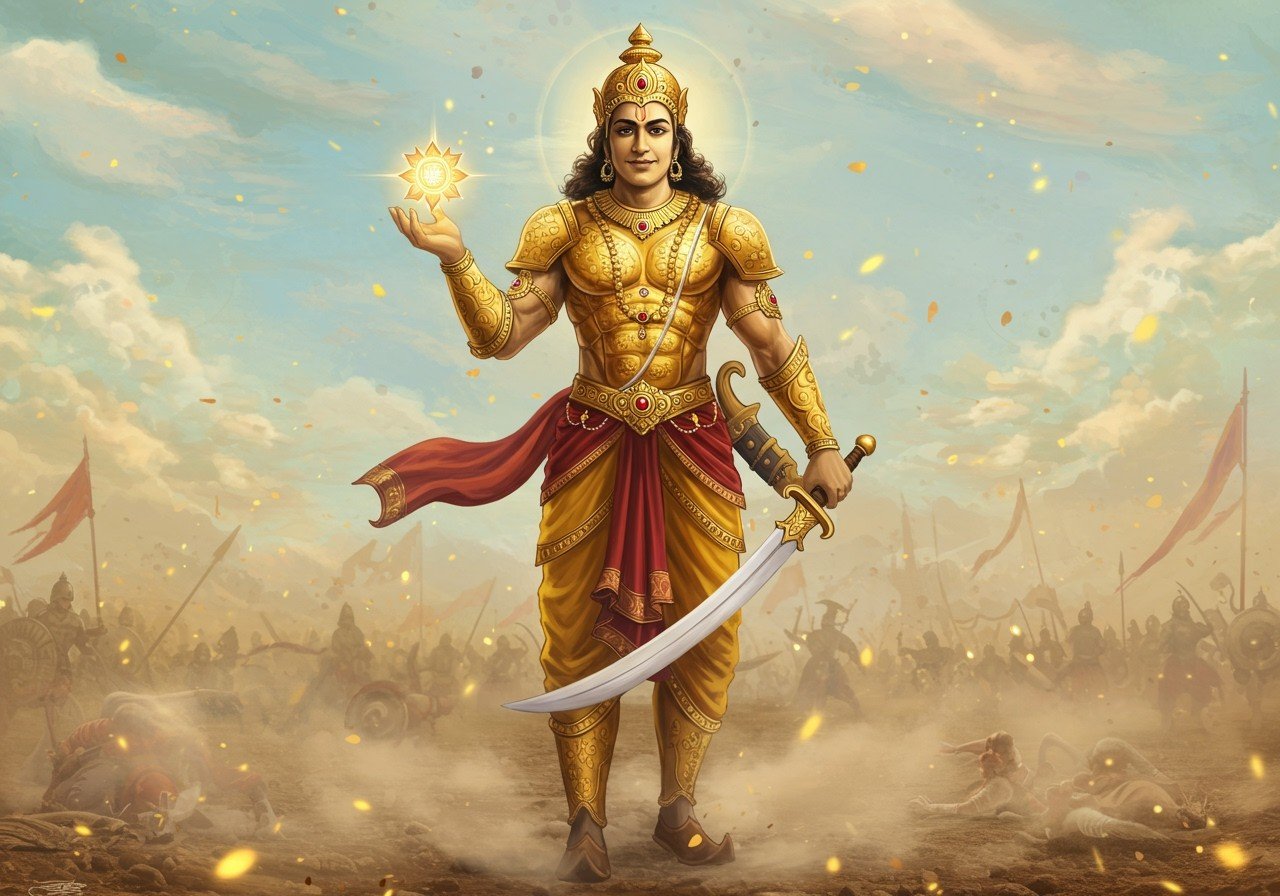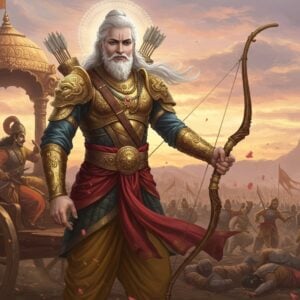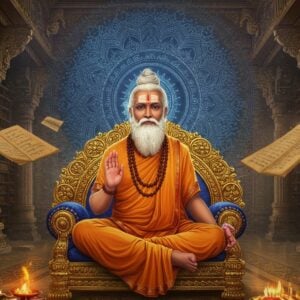
Yudhishthira, also known as Dharmaputra, stands as a shining example of morality and duty in the epic Mahabharata. Born to Kunti and the god Dharma (Yama), his life was a testament to his unwavering commitment to dharma. As the eldest Pandava and king of Indraprastha and later the Kuru kingdom, he balanced his kingly duties with profound moral principles. Let’s delve into the life of this remarkable figure, exploring his weaponry, his unwavering adherence to dharma amidst the chaos of war, and the lessons we can learn from his extraordinary journey.
Looking for authentic puja items and spiritual guidance? Visit Poojn.in, India’s leading online store for cultural and religious goods.
Yudhishthira’s Weaponry: More Than Just Instruments of War
Yudhishthira’s choice of weapons reflects his unique approach to warfare. He wasn’t just a warrior; he was a man of principles, and his weapons were extensions of his moral compass.
- The Javelin of Precision: Yudhishthira was renowned for his skill with the javelin, a weapon demanding precision and control. His proficiency with the javelin, especially the one he wielded against Shalya, originally belonging to Ishana, speaks volumes about his combat prowess. It symbolizes his focus on strategic and measured action, unlike his brothers who preferred more aggressive weaponry.
- Mahendra, the Steadfast Bow: Yudhishthira also wielded a bow named Mahendra, demonstrating his versatility in battle. The bow, a symbol of strength and resilience, represents his readiness to face any challenge while upholding his moral code. It’s a testament to his preparedness for both offense and defense, always rooted in dharma.
- The Divine Spear of Time: A Weapon of Last Resort: His most significant weapon, however, was the divine Spear of Time, a gift from the gods. This celestial weapon, reserved for the direst circumstances, embodies Yudhishthira’s unwavering commitment to justice and dharma. It signifies that while he was a man of peace, he was also capable of wielding divine power to protect the innocent and uphold the cosmic order.
- Master of Celestial Weapons: Beyond these, Yudhishthira also possessed knowledge of and the ability to counter divine celestial weapons like Agneyastra, Varunastra, Savitra, Tvashtra, Yamya, and Vayvayastra. This demonstrates his mastery over both earthly and divine weaponry, further establishing him as a formidable warrior, not just in skill but also in spiritual understanding.
Want to deepen your understanding of ancient Indian weaponry and rituals? Explore our collection of sacred texts and puja items at Poojn.in.
Dharma in the Heart of Battle: Yudhishthira’s Guiding Principle
Dharma, the moral compass, guided Yudhishthira’s every action, even amidst the chaos of war. He epitomized righteousness, often prioritizing diplomacy and peaceful solutions over aggression. His commitment to dharma, however, came with its own set of challenges:
- Upholding Dharma amidst Conflict: Maintaining dharma during the heat of battle was a constant struggle for Yudhishthira. The Mahabharata showcases how he wrestled with complex moral dilemmas, striving to balance his duty as a warrior with his unwavering adherence to righteousness. It explores the intricate interplay between dharma and warfare, and the challenges of upholding morality when lives are at stake.
- Balancing Duty and Family: Yudhishthira’s deep loyalty to his family and the Pandava cause often clashed with his moral obligations. The war forced him to make agonizing choices, often pitting his loved ones against his principles. His internal conflicts highlight the complexities of dharma and the difficult decisions one must make when loyalty and morality collide.
At Poojn.in, we offer a wide range of spiritual products, from sacred texts to puja essentials, to help you connect with your inner dharma. Browse our collection today!
The Enduring Legacy: Inspiring Generations with Dharma
Yudhishthira’s legacy as a just ruler and ethical warrior continues to resonate through generations. His life story, deeply embedded in Indian culture, serves as an inspiration for leaders, thinkers, and individuals seeking moral guidance.
- Cultural Influence: From ancient scriptures to modern-day interpretations, Yudhishthira’s story is woven into the fabric of Indian culture. His unwavering commitment to dharma has shaped ethical and philosophical thought for centuries, influencing everything from literature and art to everyday moral decision-making.
- Modern Relevance: Even today, Yudhishthira’s life offers invaluable lessons for navigating the complexities of modern life. His emphasis on integrity, justice, and compassion provides a timeless framework for ethical leadership and conflict resolution, demonstrating the enduring power of dharma in our contemporary world.
Explore our collection of culturally significant items at Poojn.in and bring the wisdom of the Mahabharata into your home.
Yudhishthira’s Wisdom: Answering the Timeless Questions
Many seek to understand Yudhishthira’s approach to warfare and dharma. Here are some common questions and their answers:
What weapon did Yudhishthira primarily use? Yudhishthira’s primary weapon was the spear, a symbol of precision and control, reflecting his thoughtful approach to combat.
Is there a specific name associated with his spear? Unlike some other divine weapons, Yudhishthira’s spear doesn’t have a widely known specific name. Its significance lies in its representation of his dharma.
How did Yudhishthira’s choice of weapon reflect his personality? His choice of the spear, rather than more aggressive weapons, mirrored his calm and composed nature and his focus on upholding dharma even in battle. It was an extension of his personality—measured, thoughtful, and principled.
What is the significance of Yudhishthira’s weapon in the larger context of the Mahabharata? Yudhishthira’s weapon symbolizes the delicate balance between warfare and dharma. It highlights the difficult choices he had to make and how he strived to remain righteous even amidst the devastation of war.
Did Yudhishthira use other weapons besides the spear? While the spear is most associated with him, Yudhishthira was proficient with other weapons like the bow Mahendra and even possessed knowledge of celestial weapons, demonstrating his adaptability and strategic prowess.
How did Yudhishthira’s approach to warfare differ from that of other warriors in the Mahabharata? Yudhishthira’s approach to warfare was unique because of his unwavering focus on dharma. Unlike others who prioritized victory at any cost, he sought to uphold righteousness and minimize unnecessary violence, even in the face of formidable opponents.
What lessons can we learn from Yudhishthira’s approach to weapons and warfare? Yudhishthira teaches us the importance of adhering to our values and principles, even in the most challenging circumstances. His story reminds us that true strength lies not just in physical power but in moral fortitude and the courage to uphold dharma, even amidst conflict.
Seeking deeper connection with your spiritual side? Find a wide selection of holy books, puja samagri, and more at Poojn.in. We also offer a dedicated section of low-value products to make spirituality accessible to everyone.


